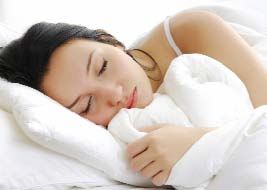

What’s
New About Sleep?
Dr.
George Traitses

An old Chinese proverb states, “Only when one cannot
sleep does one know how long the night is.” Almost
everyone can relate to those words at some point in
life. In younger people, stress and worry commonly
cause insomnia. Older people suffer from a natural
decrease in melatonin—a sleep inducing hormone.
Pressures from job and family, illness, side effects of
some medications, and aches and pains caused by
uncomfortable beds or pillows can also rob us of
sleep.
Television and computers may also contribute to sleep
problems. Computer use, especially in the workplace,
has been associated with all types of insomnia in
adults—more so than stress, which affects only difficulty
falling asleep and early morning arousal. Studies
have found that unlimited TV, computer, and Internet
use cause sleep deprivation in children—they go to
bed later, sleep fewer hours, and feel more tired.
Extensive television viewing in adolescence may result
in adult sleep problems. Playing computer games may
affect adults, as well. A Japanese study found that
performing exciting tasks on computers with bright
monitors at night affects melatonin concentration and
the human biological clock, interfering with sleep.
Overall, 40 million Americans suffer from chronic sleep
disorders each year, and an additional 20 million have
occasional sleeping problems.6 Deep sleep helps
children grow and improves their learning ability. Lack
of sleep affects the immune and nervous systems,
memory, judgment, attention, patience, and thinking
and reading abilities. It can be especially dangerous for
those who drive. The National Highway Traffic Safety
Administration estimates that sleep deprivation is
responsible for 100,000 vehicle accidents a year,
resulting in 1,500 deaths and 71,000 injuries.
Sleeping problems are common in people with most
mental disorders, Alzheimer’s, stroke, cancer, and head
injury. In hospitalized patients, sleep deprivation may
be worsened by treatment schedules and routines.
Insomnia contributes to the patients’ confusion, frustration,
or depression. They become more sensitive to
pain and may request increased pain medications.
Recent research shows that the old advice of sleeping
in a comfortable bed in a cool bedroom, eating an
early dinner, going to bed at the same time each night,
and avoiding caffeine and alcohol before sleep may
not work for everyone. Sleep medications are not
suitable for long-term use. So, what can we do when
all the known remedies have been tried, but sleep is
nowhere to be found?
Sleep experts recommend the following:
• On weekends, go to bed at the same time as
on weekdays.
• If you exercise in the evening, do so at least 3
hours before bedtime. Also, stay away from
evening brain-stimulating or stressful activities,
such as balancing checkbooks, reading
thrillers, and playing computer games.
• Develop a sleep ritual that will help you to relax
and unwind, such as a warm bath.
• Try listening to relaxing music before going to
sleep. Soothing music may improve sleep quality
in children, older adults, and critically ill
patients.
• Limit your child’s exposure to TV or video
games to less than 1 hour a day. Long hours
spent in front of the TV may lead to not only
sleep problems, but also headache, back pain,
and eye symptoms. Make sure there is no television
set in your child’s bedroom.
• Be sure your children go to bed early and get
enough sleep. Children between 3 and 6 years
of age should get 11-13 hours of sleep at
night. Children from 1st to 5th grade should
sleep 10-11 hours.19 Late bedtimes and short
sleeping hours have been strongly associated
with childhood obesity.
• Older people should take 30-minute afternoon
naps to reduce sleepiness and fatigue and
improve mood and performance.
• Sleep on a comfortable, supportive mattress
and pillow. Talk to your doctor of chiropractic
about choosing the bed and pillow that are
right for you.
Researchers are looking into several possible alternative
sleeping aids. Although they have not been widely
researched, sleep experts agree—it can’t hurt to try
them:
• Acupuncture has been proven effective for
some sleep disorders and anxiety.
• Therapeutic touch and relaxing back massage
are useful for promoting sleep in critically ill
patients.Traditional chiropractic care may
also help those with spasms, pain, and joint
dysfunction of the neck and back.
For more information on health and safety visit the Ontario Chiropractic Association
Web site at www.chiropractic.on.ca or call 1877-327-2273.
Dr. George Traitses, 416-499-5656, www.infinite-health.com
<Sidebar>
Indications of insomnia
• Taking more than 30 to 45 min. to fall
asleep
• Waking up many times each night
• Waking up early and being unable to get
back to sleep
• Waking up feeling tired.
Potentially Helpful Supplements
Valerian (Valeriana officinalis) may be more appropriate
for longterm use than sleep medications.
Although sleeping medications impair vigilance
the morning after use, valerian does not. More
studies are needed, however, to assess valerian’s
effectiveness and establish the optimum dose.
German chamomile, hops, lavender, lemon
balm, passionflower, and wild lettuce have been
said to have mild sedative properties, but need
more scientific investigation
Melatonin supplements may be useful for treating
some insomniacs. They appear to be safe
when used for days or weeks—but the long-term
use safety is not clear.
Note: Pregnant or nursing women, children under
3 years of age, and people who use alcohol or
sedative drugs, should check with their doctor
before taking any of these supplements.
Dr. George I. Traitses
D.C., B.Sc.(Hon.), M.Sc., C.H.N., C.N.M., A.C.R.B. 3, C.R.A.